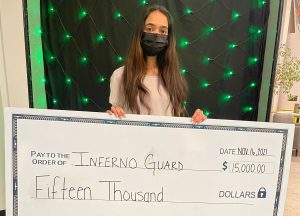
Three teams founded by Johns Hopkins University faculty members or students have each received $50,000 in Microsoft Innovation Acceleration Awards, which support digital technologies. The awardees are tackling wildfire detection, next-generation antibody therapeutics and noninvasive colorectal cancer screening.
The awards are an extension of a collaboration established in 2020 between Johns Hopkins Technology Ventures (JHTV) and Microsoft to help startups launch, scale and commercialize. More than a dozen have joined the Microsoft for Startups program in the last two years and received access to technology including Azure, Microsoft 365 and GitHub enterprise programs, as well as Microsoft commercialization support. JHTV also has facilitated almost 100 office hour sessions for Johns Hopkins innovators and the team from Microsoft.
During this cycle of the Microsoft awards, JHTV received a record 26 applications from a mix of faculty members, undergraduate and graduate students, and licensed startups, according to Mark VanderZyl, associate director for startup advancement at FastForward, JHTV’s startup incubator. The digital solutions addressed a variety of areas, including drug development, medical devices and environmental science.
“This application process was a great illustration of just how many industries can be supported by innovation in the digital space, as well as the breadth of innovation occurring at Johns Hopkins,” says VanderZyl, who manages the relationship between JHTV and Microsoft. “We’re thankful to have such a great partner in Microsoft and look forward to seeing how this year’s awardees and all of the teams working with Microsoft continue to advance.”
The award recipients are:
Ably Bio, a deep-learning platform for rapid development of next-generation antibody therapeutics, is being developed by Jeffrey Gray, a professor in the Department of Chemical and Biomolecular Engineering at the Whiting School of Engineering; Jeffrey Ruffolo, a molecular biophysics Ph.D. candidate who works in Gray’s laboratory; and Tim Aikin, a graduate student Molecular Biology and Genetics. Their software can predict antibody structure from an amino acid sequence

Nandita Balaji, co-founder of InfernoGuard
InfernoGuard, which is developing an early wildfire detection and warning system. The startup — co-founded by Nandita Balaji, a Johns Hopkins University sophomore neuroscience and computer science major — won the $15,000 top prize during FastForward U’s Fuel Demo Day last fall, as well as a $100,000 grand prize in February during the Arizona State University Innovation Open pitch competition.
SpectralDx, a novel, noninvasive, camera-based colorectal cancer screening option for patients that uses a smartphone attachment, is being developed by Simon Mathews, an assistant professor in the Division of Gastroenterology and Hepatology at the Johns Hopkins University School of Medicine; and Amit Banerjee, a senior research scientist at the Johns Hopkins University Applied Physics Laboratory.
“The goal of Microsoft’s collaboration with FastForward and Johns Hopkins Technology Ventures is to work closely with startups using data science and artificial intelligence to help them launch, scale and bring their solutions to market,” says Sally Frank, worldwide lead for health and life sciences at Microsoft. “We congratulate the recipients of the 2022 Microsoft Innovation Acceleration Award and look forward to supporting them on their journey to build impactful products in health and environmental sciences.”
Past recipients of the award say the funding has made a significant impact on their work. Visilant, a startup that develops software products to enable screening and automated diagnosis of blinding anterior segment eye diseases, used its award last year to grow its team, collaborate with eye care systems around the world and complete a proof of concept, according to co-founder Kunal Parikh.
“The Microsoft award served as important validation for our work leveraging digital technology and artificial intelligence to improve access to eye care for underserved patients,” says Parikh, a faculty member with the Center for Nanomedicine at the Wilmer Eye Institute and the Center for Bioengineering Innovation & Design, both at Johns Hopkins. “Without this type of support, it can be extremely difficult to advance to the next level of venture development and financing.”